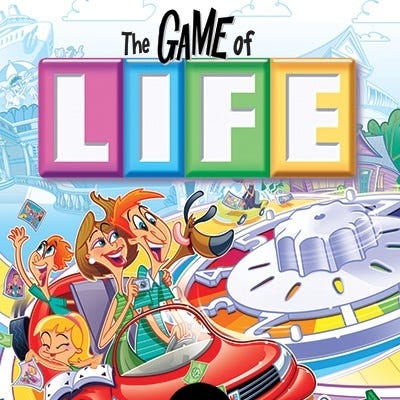Light Hive offers essays on applied mindfulness for complex identities, the polycrisis, and the power of play. Subscribe for contemporary interpretations of Buddhist wisdom, through the lens of a recovering academic and queer, transracial adoptee.
Hi friends! Or…yeah, we’re friends, right? Kinda?
My “real life” friend Daniel has allergies. Throughout stay-at-home orders, he would not come over because of his severe reaction to my cats. But when I ran from wildfire this January, he showed up...or, rather, I did. And he welcomed me not out of obligation, but because he needed me to finish a gigantic Tupperware full of Christmas cookies of friendship.
This essay suggests friendship is a central and culturally undervalued aspect of life. This is the 9th of 10 Perfections in this nearly-completed series on qualities one can develop through daily life practice.
When we practice lovingkindness toward our friends, we build toward a wider culture of mutual care and recognition.
Metta
Lovingkindness: a mental state that maintains every living being is worthy of safety, happiness, and kindness. Friendship resides at the center of spiritual life.
Metta talks and meditations offer such balms, especially from teachers like Tara Brach or Sharon Salzberg, who advocate for trusting the gold within each of us. Metta, spreading unconditional friendliness and regard in all directions, just feels good.
And it’s not just nice. Lovingkindness can be a rigorous, radical worldview that invites us to recognize the basic worth of every being, not just when it’s convenient.
This includes our friends, even when they’re saying things we feel compelled to correct. Even the Buddha did it.
In the Upaddha Sutta, when Ananda suggests that friendship is "half of the holy life," the Buddha immediately corrects him: “Don't say that, Ananda. Don't say that. Admirable friendship, admirable companionship, admirable camaraderie is actually the whole of the holy life.”
But making friendship central to life stands in stark contrast to how our current social systems position it.
Undervalued Friendships
Loving friendships provide space […] to learn to process all our issues, to cope with differences and conflict while staying connected. — bell hooks
In a city like Los Angeles, transit isn’t easy. The capacity to show up is shaped by class: who has time off, who can afford dinner out, who has emotional bandwidth after a double shift. Add on factors like kids, or a second job, or not having a car, and every in-person engagement becomes a real choice.
So when we do gather, we might feel compelled to enjoy it in a culturally condoned and recognizable way. In direct contradiction to metta practices, vulnerability feels like an exhausting burden, an unnecessary disclosure, rather than an admission of humanity. Can’t you just have a good time?
And even if the relationships with people we classified as “safe” sour over time, it’s easy to fall into the sunk cost fallacy of having invested so much, that releasing the connection would feel like a personal failure.
Another part of the isolationist and individualistic culture of the West is the centrality of the nuclear family. We're taught that monogamous partnership is the pinnacle of connection. There's even a board game for this.
In the classic Game of Life, the path is linear and predetermined: education, career, marriage. In Life, the car you were apparently born with pulls over until you marry. Success is measured by money accumulated and family status achieved. Slam those offspring pegs into your tiny vehicular birthright and you’re on the way to winning Life.

Friendships rely on mutual care precisely because they exist outside and beyond these normative structures. It's all an extra choice, an extra offering of presence, and a negotiation of energy levels as you navigate the unpredictable, inevitable blips and bloops of life.
Please don’t misunderstand: this isn’t just a matter of finding your entourage and calling it. Maintaining 1:1 friendship is hard on so many levels and impermanence is real. Friendship can be an attitude of wider friendliness toward all living beings.
Similar ideas have emerged in places beyond the dharma.
Friendship as a Way of Life
"To be 'gay,' I think, is not to identify with the psychological traits and the visible masks of the homosexual, but to try to define and develop a way of life.” - Foucault
For those of us with layered identifications, friendship can mean survival. As a queer adoptee, I've experienced how chosen family and “kinship by design” (to reappropriate adoption scholar Ellen Herman’s term) becomes essential in the absence of biological or legal family ties.
This experience isn't unique to me. Historically, friendship networks have been the lifeline for queer communities, adoptees, and other marginalized groups. During the AIDS crisis, when government institutions and families of origin refused care, it was friends who showed up, who nursed each other, who held memorial services when biological families wouldn't claim their deceased, queer children.
No one “needed to.” They did it because they wanted.
And so friendship and care as resistance to prescribed social patterns isn't a new idea. In a 1981 interview “Friendship as a Way of Life,” Michel Foucault opined that it wasn’t sexual acts that made homosexuality threatening, but the alternative forms of connection it created: "homosexuality threatens people as a 'way of life,' rather than as a way of having sex."
The interview’s core insight remains relevant: friendship as a chosen, non-institutional bond disrupts the scripts of heteronormativity, capitalism, and control.
Hot-take: Foucault would have hated The Game of Life.
Queer kinship models have long shown us what it means to build care beyond contracts, and one doesn’t need to identify as such to practice mutual care.
When we practice metta toward friends—recognizing their inherent worth outside any utilitarian value—we participate in an alternative "way of life."
In a world dominated by transactional thinking and zero sum games, even for islands full of penguins, friendliness is both a spiritual practice and a political stance.
Sangha as Resistance
In friendship, we can see the light in each other and, when one of us forgets, the other can provide gentle reminders.
We weren’t meant to do this alone or with just one other person forever.
Our culture encourages isolation—through economic pressure, suburban sprawl, and tech-fueled disconnection. But friendship, freely chosen and tended, resists this narrative.
The practice of metta toward friends becomes not just personally uplifting, but politically radical. To insist on metta in a time of institutional and ecological sabotage is to effort toward the normalization of care. In a real way, this is the groundwork for unions, mutual aid groups, and activist organizations.
These, too, are sanghas—spiritual communities—practicing collective liberation through relationship.
Until next time: may you be happy. May you be safe. And the next time you seek refuge, may you, too, find a friend armed with dozens of “only kinda old,” “probably fine” sugar cookies ready to take you in.
So what do you think? What does “friend” or “friendliness” mean to you?
If you liked this, consider checking out:
Takeaway Practice
Practicing metta for a friend.
For this takeaway practice, I’m going to suggest a specific form of breathing with intention, inspired by the Tonglen tradition.
During your next sit, call to mind a friend without any current charge. As you can, keep them your focus.
Then, as you breathe in, imagine yourself inhaling all their worries, troubles, challenges. And as you breathe out, imagine yourself blowing kindness, validation, and love to them.
This doesn’t need to be like sucking down a milkshake or blowing out candles. Let it be gentle. And don’t forget to thank yourself for the practice, too.
Creative Coalition: June 9, 16, 23rd, 6-7:30 PT
Join Creative Coalition to practice with patience, play, and mindful writing.
In June, I’ll be offering a very simple drawing, reflecting, and sharing exercise based on Gene Koo’s The Bonsai Diary. You don’t need to buy anything.
Unlike the usual monthly gathering, this will unfold over three Mondays in 90-minute sessions. We’ll have a lightly guided sitting practice, followed by some prompts from the game. Instead of closing with a debrief, we’ll close with sharing.
Base Rate: $30
Light Hive Readers may use code: Hive50 (50% off)
Paid subscribers get this for free! I’ll send the sign-up code in the paid chat later today.
No one is turned away for lack of funds. If the registration fee is cost-prohibitive, please email for the link.
Bio
Logan Juliano, PhD (they/them) blends rigor and lived experience to create brave spaces where mindfulness meets playful exploration. Through Light Hive and as co-editor of Notes from the Inflection Point, they write to share reflections and practices amid ecological and social uncertainty. Logan holds a PhD in Performance Studies and is neither a mental health provider, nor an authorized teacher in any Buddhist lineage. They are still waiting for a teaching assignment for next year. The pins! The needles!





